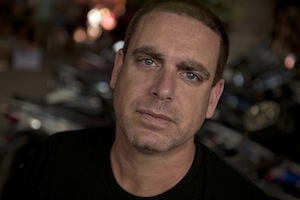Left to right, Boni Putera, Titi Juwariyah and Bambang “Ho” Mulyono are the charismatic musicians at the heart of Daniel Ziv’s (inset) documentary Jalanan. (photo from jalananmovie.com)
Daniel Ziv’s first feature-length documentary, the multiple-award-winning Jalanan (Streetside), tells the uplifting, engaging story of three musicians who are part of a bustling street scene in Jakarta: Boni Putera, Bambang “Ho” Mulyono and Titi Juwariyah. Instead of playing on street corners, these captivating and charismatic buskers board city buses, transforming ordinary commutes into musical, spiritual and political journeys through Indonesia’s capital, a mega city of 10 million.
Ziv, who was raised in Vancouver, spoke with the Independent by email after the Vancouver International Film Festival, where Jalanan had its North American première. An author and political commentator, Ziv has lived in Indonesia since 1999.
JI: How did you get started with filmmaking and how did you come to this project in particular?
DZ: Jalanan is my first film, and I never intended to be a filmmaker. Rather, the amazing story of these Jakarta street buskers, and how I felt that story, could illuminate so much about Indonesia as a society, and even globalization, sort of appeared in front of me and kept lingering there until I felt it needed to be told. Since the tale naturally contained so much music and energy and movement across this gritty urban space, I felt that film would be the right medium. So, I spent awhile getting to know the tools, and then learned through trial and error. Although filmmaking skills would have come in handy, I still believe that having a good story and good access are what really make a strong documentary. No degree of technical wizardry can replace those things.
JI: How were Boni, Ho and Titi chosen as the protagonists? Were there security concerns?
DZ: I knew that for the film to work, to really grab the attention and win the hearts of viewers, I needed strong lead characters – people with charm and charisma and agency, people with something to say about life. When I met Boni, Ho and Titi, I knew in each case that they would stand out as colorful individuals that viewers would be happy to spend two hours with in a theatre, or a few days with on the street, or even five years, as I did. They weren’t the archetypical victims that poor people are so often made out to be in social documentaries. They took control of their own fate, and they were fun to be with. And, of course, I looked for buskers with some musical talent and, more importantly, who composed their own songs and lyrics, which in turn reflected their condition. This added a whole other narrative device to the film that wouldn’t be there if it was just people talking into a camera.
In terms of safety, there actually weren’t really any issues. People assume since Jakarta is an enormous, chaotic, unruly, corrupt city, that it’s also somehow dangerous, but it’s not…. I spent five years shooting the film, totally exposed in some of the poorest parts of the city, carrying perhaps $10,000 worth of camera and sound equipment on me, yet I was never once harassed or mugged or even pickpocketed. I think if you’re at ease with your environment, the environment accepts you, but, of course, it helped that I’m fluent in Indonesian and that people knew I was with Boni, Ho and Titi. It provided me with a kind of street cred and belonging. I wasn’t some tourist leering in.
JI: What attracted you to Indonesia?
DZ: I didn’t plan any of this. I discovered Indonesia as a young backpacker in the early ’90s and was captivated by the country and its people, and then just kept going back. I did an MA in Southeast Asian studies and began a PhD in Indonesian politics, which is what moved me to Jakarta in 1999 for a year of field research. Then, I just got drawn into the dynamic changes that were happening to Indonesia at that time and into some irresistible job opportunities ranging from journalism and humanitarian aid work to book writing and filmmaking. And I got to work with the most amazing people, many of whom were the next generation of Indonesian artists and politicians and media personalities and social entrepreneurs. All of this has added up to a pretty fascinating career and life, but I also feel it’s been the result of deliberate choices: I didn’t opt for a safe, conventional path; I didn’t care about pedigree or official titles or big salaries. I only chose jobs that were truly meaningful.
JI: What were the challenges (rewards) of working on this project?
DZ: I guess the thing that is both the most challenging and rewarding is the intense experience of dreaming something up out of nothing, having the chutzpah and persistence to think you can create something that comes from inside you that wasn’t there before, and that it can actually find an audience and resonate with others…. [W]hen you make a film like this, that contains so much of your own experience and sensibility and sweat and tears, it’s really scary to wrap it up and then just watch the lights dim in a packed theatre and wonder if it will even work, if your vision and story will connect with people from a totally different culture and experience. And, when it does, it’s truly exhilarating.
JI: The response to the film has been positive. What’s that been like?

DZ: Of course, it’s immensely gratifying. My greatest fear after all the hard years of work was that it would just go nowhere … but the opposite has happened, and the film’s political and social impact in Indonesia in particular has been incredible. Jalanan captured the imagination of the public and the media, and contributed to concrete policy changes at the highest level of government, which is something none of us dreamed of.
Boni, Ho and Titi are now mini-celebrities in Indonesia, so, of course, it’s been amazing for three marginalized individuals to be publicly acknowledged in that way and to become role models within their community.
JI: Boni, Titi and Ho have multiple challenges, but they seem to be living satisfying lives. Are there lessons for those of us who, by many accounts, have more privilege or opportunity?
DZ: Certainly. But I’ve always been averse to simplistic, clichéd responses like “If poor people aren’t complaining, who are we to be discontent with our lives?” I mean, of course it’s important to recognize that we have privileged lives, but I think anyone’s pain or challenges are independently valid and very real. Having money and comfort doesn’t immunize us from pain, and being dirt poor doesn’t deny them immense joy. This is why it was so important for me to not let Jalanan become an exercise in finger waving or audience guilt. In fact, what I think many viewers respond to most is not how different they are than Boni, Ho and Titi, but how much of ourselves we see in them, and them in us. I think poverty needs to be de-fetishized and dealt with at face value, and poor people need to be seen as our friends and equals, rather than as objects to be analyzed or pitied. I know they prefer it that way.
JI: Are you still in touch with Boni, Ho and Titi?
DZ: We are close friends, and in almost daily contact. They are doing well, and enjoying a whole slew of new opportunities opening up to them as a result of the exposure from the film, but … they are still members of Jakarta’s marginalized poor, they are vulnerable and face multiple challenges. This is why I’ve started up a fundraising campaign that aims to buy each of them a small, humble house in a simple Jakarta neighborhood, something that will put a roof over their heads for life (details at jalananmovie.com/housingfund).
JI: I read an article in which you said that the buskers “were really just the lens through which we could manage a far bigger, more complex view of the country today.” Can you expand on that? Why do you think it took an expat to make an Indonesian film that had such global appeal?
DZ: That’s a great question. My interest from the start was in trying to understand, and hopefully shedding light on, Indonesia. I don’t think there’d have been anything inherently fascinating or important in a film that merely focuses on street busking, so my agenda was to probe deeper and treat my protagonists as a kind of microcosm for the country at this really fascinating juncture in time.
I’m not convinced an Indonesian couldn’t have made this film and, strangely, quite a few reviewers in Jakarta remarked that Jalanan feels “like a totally Indonesian film” rather than a documentary shot by a foreigner…. But this is probably because I created the space for Boni, Ho and Titi to tell their own very Indonesian story in their own voices and perspectives, and left space for my very talented Indonesian editor, Ernest Hariyanto, to lend his local sensibility to the cut. My goal was to open a window on to Indonesia, not to interpret it in my own image.
JI: Were you raised in a Jewish environment and, if yes, did it affect your choice of profession or other aspects of your life/filmmaking?
DZ: It’s probably fair to say my choice of profession was despite my Vancouver Jewish environment, not because of it. I grew up surrounded by a community of lawyers and doctors and academics and business folks, and most of my childhood friends didn’t stray far from that. I was lucky to have parents who secretly admired the creative and adventurous tendencies my sisters and I harbored.
One of my sisters became a ceramic artist and urban heritage expert; my other sister is a professional chef and musician. Our parents never pushed us toward establishment careers. They taught us a love for travel and culture, and that it was more important to lead an interesting life than a safe one. They probably got more than they bargained for in my case, and lament the fact that I live halfway across the world, but I doubt they’d be any happier if I were a senior partner at a downtown law firm. And, I dare say, they seemed pretty proud when the lights came on at the end of our screening … at VIFF.
Basya Laye is a Vancouver freelance writer and former editor of the Jewish Independent.

